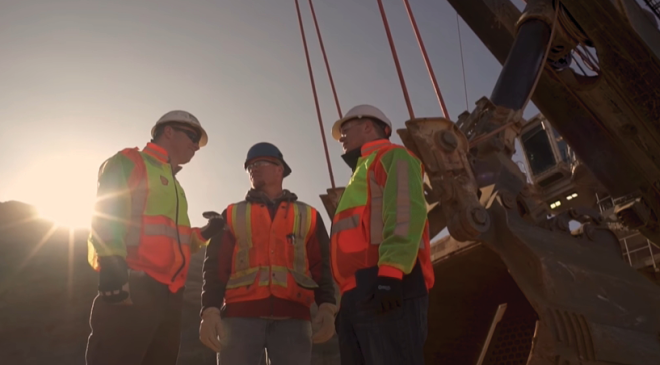
Mining electrification has a new player – oil and gas company Shell – which has built an end-to-end mining electrification pilot with a consortium of several companies that will work together to fast-track off-road mining vehicle electrification.
Shell announced October 12 its new nine-member consortium to create the pilot offering of electrification solutions for mining sites. Members also include Skeleton, Microvast, Stäubli, Carnegie Robotics, Heliox, Spirae, Alliance Automation and Worley.
The group now introduces Shell’s Mining Electrification Solutions for Off-Road Vehicles, which will be an interoperable electrification system to reduce emissions without compromising efficiency or safety, while at the same time aiming to be cost competitive versus diesel-powered operations.
“The pilot offer combines an innovative, high-powered battery solution with ultrafast charging and a standardized microgrid energy system where the required solution can be complemented with renewable electricity generation on-site or through the grid,” Shell said of the group’s plans, stressing that electrification can offer off-road industries an “immediate potential” to shift away from long-standing reliance on diesel.
Per Shell’s data, and regarding hard-to-abate sectors like mining, the shift from diesel is critical since mobile equipment comprises between 40% and 50% of mining’s CO2 emissions.
By 2030, it is estimated that a battery-electric haulage truck will lower total cost of ownership (TCO), involve 20% lower maintenance costs; and incur 40% lower fuel costs than existing diesel trucks.
“It is increasingly clear that no one, single organisation can solve decarbonization alone,” said Grischa Sauerberg, vice president, Sectoral Decarbonization and Innovation at Shell.
“The need for a collaborative effort is particularly evident within carbon-intensive industries like mining, where the challenges are great but the opportunities are even greater. To overcome these challenges and unlock these opportunities, Shell is helping to bring together some of the sector’s most innovative companies – with electrification proving an important first step towards the shaping of a clear decarbonization pathway.”
Shell’s Mining Electrification Solutions for Off-Road Vehicles consists of:
- Power provisioning and microgrids: aim to provide a consistent and reliable supply of renewable power in a safe and stable manner.
- Ultra-fast charging: taking approximately 90 seconds via flexible, hardwearing and resilient, on-site, ultrafast charge- points, which provide assets with continuous operations in the most challenging of environments.
- In-vehicle energy storage: through a combination of advanced battery and capacitor technologies that aim to deliver long lifetimes, ultra-fast charging and high performance.
As a result, mining operators are set to benefit from an integrated electrification solution that:
- Is end-to-end, covering the full journey of the electron from generation to delivery in the drive train.
- Is interoperable between different Original Equipment Manufacturer (OEM) make and models, giving mining operators greater flexibility.
- Is modular in design to allow mining customers the opportunity to tailor solutions to their specific needs.
- Reduces emissions without compromising on operational efficiency or safety.
“The challenge of decarbonization is immense, but not impossible – providing collaboration and innovation go hand in hand at all times,” said Sauerberg.
“Both of which were on show during the recent Charge On Innovation Challenge, which saw the Shell-led consortium of equipment manufacturers, technology partners, industry experts and Shell Energy – our in-house supplier of renewable power – push the boundaries of what is possible for hard-to-abate sectors like mining. Our winning solutions are proof of how, together, the industry can help power progress by realizing the full potential of the technologies available to us – whether that is through electrification, digital tools or low-carbon fuels.”
